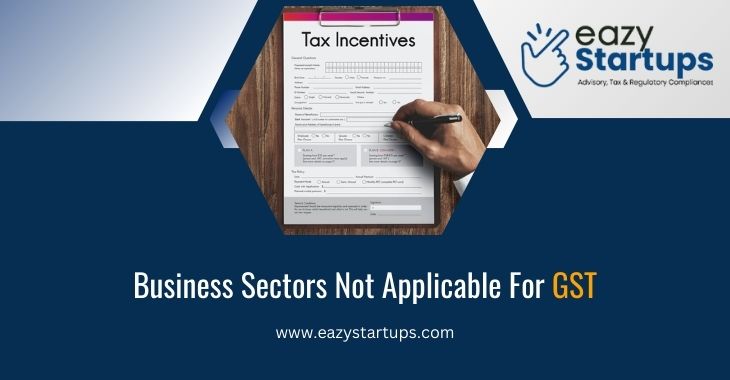The Goods and Services Tax (GST) is a comprehensive tax regime implemented in India to streamline and simplify the indirect tax structure. While GST applies to a vast array of goods and services, certain business sectors are exempt from this taxation. Understanding these exemptions is crucial for businesses to ensure compliance and optimize their tax liabilities. At Eazy Startups, we specialize in GST filing and Online GST Registration in India, helping businesses navigate the complexities of the GST framework with ease. In this blog, we’ll explore the business sectors not applicable for GST and provide insights into how Eazy Startups can assist you.
- Agricultural Products
- Educational Services
- Healthcare Services
- Financial Services
- Charitable and Religious Activities
- Services by Government
Agricultural Products:
Agriculture is the backbone of India’s economy, and to support this vital sector, the government has exempted certain agricultural products from GST. These include fresh fruits and vegetables, grains, milk, and eggs. Additionally, services related to cultivation, harvesting, threshing, plant protection, and supply of farm labor are also exempt from GST. This exemption aims to reduce the financial burden on farmers and promote agricultural growth.
Educational Services:
Education is another sector that enjoys significant GST exemptions. Services provided by educational institutions up to higher secondary school level, along with vocational training recognized by the National Skill Development Corporation, are exempt from GST. This exemption ensures that basic and vocational education remains affordable and accessible to all, fostering a well-educated and skilled workforce for the future.
Healthcare Services:
Healthcare services are crucial for the well-being of the population, and the government has recognized this by exempting various healthcare services from GST. Services provided by hospitals, clinics, and authorized medical practitioners are GST-exempt. Additionally, diagnostic services and medical treatment are also free from GST. This exemption is intended to keep healthcare services affordable and accessible to all citizens.
Financial Services:
Certain financial services are also exempt from Online GST Registration in India. These include services provided by banks and financial institutions such as interest on loans, advances, and deposits. Additionally, services related to the sale or purchase of foreign currency and securities are exempt. By exempting these services, the government aims to maintain the stability and growth of the financial sector.
Charitable and Religious Activities:
Charitable and religious activities play a significant role in Indian society, providing essential support and services to those in need. To encourage these activities, the government has exempted services provided by entities registered under Section 12AA of the Income Tax Act from GST. This includes services related to religious ceremonies and activities conducted by religious institutions. The exemption helps these organizations focus on their charitable and religious missions without the burden of GST.
Services by Government:
Certain services provided by the government are also exempt from GST. These include services related to public transportation, such as passenger transport by railways in non-AC class and metro services. Additionally, services related to public utilities like water supply and sanitation are GST-exempt. This exemption ensures that essential public services remain affordable for the general population.
Final Words
In conclusion, understanding the business sectors exempt from GST is crucial for optimizing tax liabilities and ensuring compliance. At Eazy Startups, we’re committed to helping businesses navigate the GST framework with ease, providing expert support for GST filing and Online GST Registration in India. Contact us today to learn more about how we can assist you in managing your GST obligations effectively.

